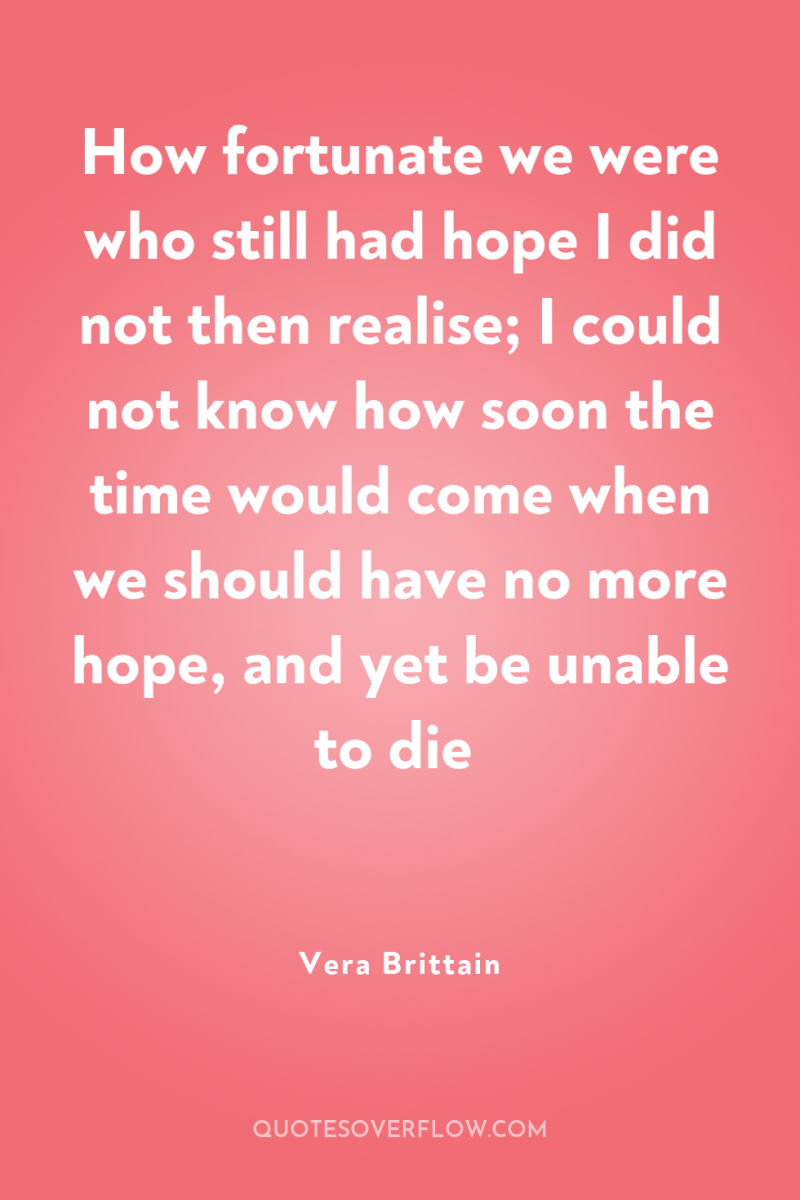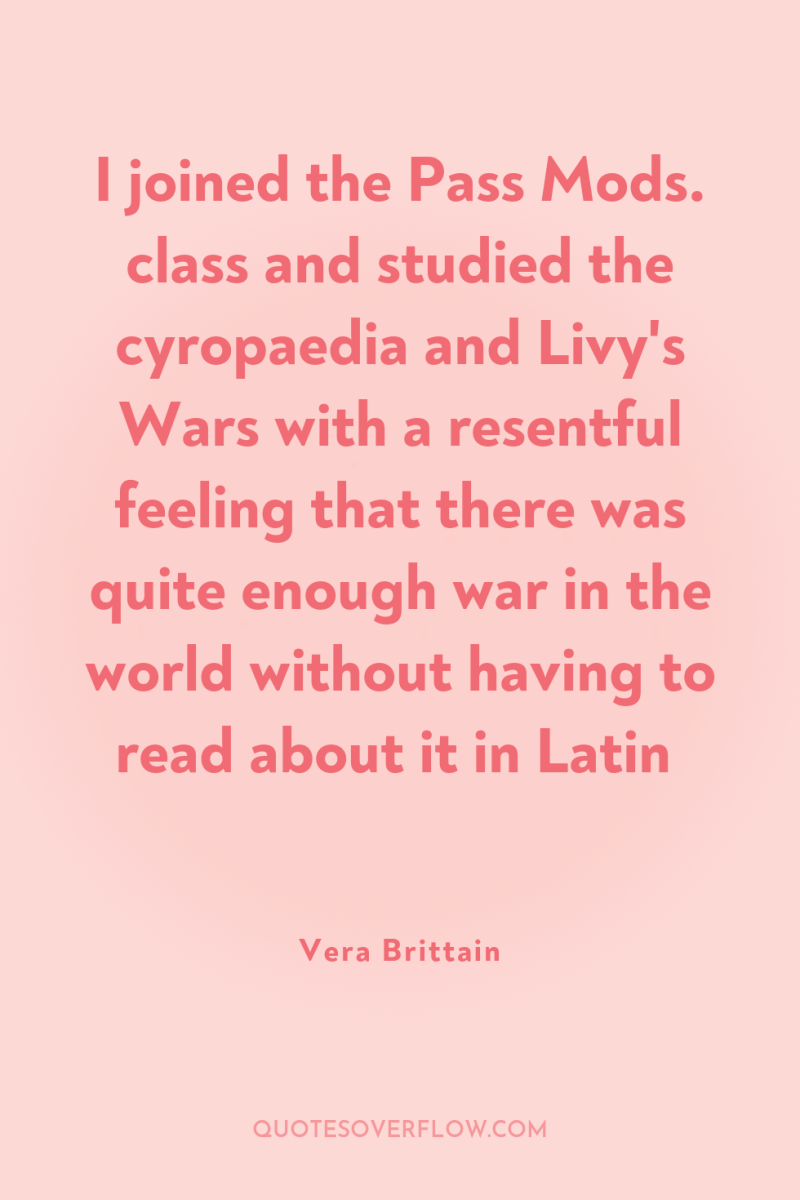
1
How fortunate we were who still had hope I did not then realise; I could not know how soon the time would come when we should have no more hope, and yet be unable to dieVera Brittain
2
Perhaps .. To R.A.L.Perhaps some day the sun will shine again, And I shall see that still the skies are blue, And feel one more I do not live in vain, Although bereft of you. Perhaps the golden meadows at my feet, Will make the sunny hours of spring seem gay, And I shall find the white May-blossoms sweet, Though You have passed away. Perhaps the summer woods will shimmer bright, And crimson roses once again be fair, And autumn harvest fields a rich delight, Although You are not there. But though kind Time may many joys renew, There is one greatest joy I shall not know Again, because my heart for loss of YouWas broken, long ago.Vera Brittain
3
Only, I felt, by some such attempt to write history in terms of personal life could I rescue something that might be of value, some element of truth and hope and usefulness, from the smashing up of my own youth by the war.Vera Brittain
4
When the sound of victorious guns burst over London at 11 a.m. on November 11th, 1918, the men and women who looked incredulously into each other's faces did not cry jubilantly: " We've won the war! " They only said: " The War is over.Vera Brittain
5
It is, I think, this glamour, this magic, this incomparable keying up of the spirit in a time of mortal conflict, which constitute the pacifist's real problem--a problem still incompletely imagined and still quite unsolved. The causes of war are always falsely represented; its honour is dishonest and its glory meretricious, but the challenge to spiritual endurance, the intense sharpening of all the senses, the vitalising consciousness of common peril for a common end, remain to allure those boys and girls who have just reached the age when love and friendship and adventure call more persistently than at any later time. The glamour may be the mere delirium of fever, which as soon as war is over dies out and shows itself for the will-o'-the-wisp that it is, but while it lasts, no emotion known to man seems as yet to have quite the compelling power of this enlarged vitality.Vera Brittain

6
When the Great War broke out, it came to me not as a superlative tragedy, but as an interruption of the most exasperating kind to my personal plans.Vera Brittain
7
I found it not inappropriate that the years of frustration and grief and loss, of work and conflict and painful resurrection, should have led me through their dark and devious ways to this new beginning.Vera Brittain

8
I joined the Pass Mods. class and studied the cyropaedia and Livy's Wars with a resentful feeling that there was quite enough war in the world without having to read about it in LatinVera Brittain
9
Tired as I was of conflict, I felt that I must not shrink from the fight, nor abandon in cowardice the attempt to prove, as no theories could ever satisfactorily prove without examples, that marriage and motherhood need never tame the mind, nor swamp and undermine ability and training, nor trammel and domesticise political perception and social judgement. Today, as never before, it was urgent for individual women to show that life was enriched, mentally and spiritually as well as physically and socially, by marriage and children; that these experiences rendered the woman who accepted them the more and not the less able to take the world's pulse, to estimate its tendencies, to play some definite, hard-headed, hard-working part in furthering the constructive ends of a political civilisation .Vera Brittain
10
That's the worst of sorrow .. . it's always a vicious circle. It makes one tense and hard and disagreeable, and this means that one repels and antagonises people, and then they dislike and avoid one--and that means more isolation and still more sorrow.Vera Brittain
11
People talked so foolishly, I thought, about the ennobling effects of suffering. No doubt the philosophy that tells you your soul grows through grief and sorrow is right--ultimately. But I don't think this is the case at first. At first, pain beyond a certain point merely makes you lifeless, and apathetic to everything but itself.Vera Brittain
12
I am less blindly confident than I once was, for I have been learning a truer estimate of myself, my failings and limitations, in these dark days. I have learnt to hope that if there be a Judgment Day of some kind, God will not see us with our own eyes, nor judge us as we judge ourselves.Vera Brittain
13
Why, I wondered, do people who at one time or another have all been young themselves, who ought therefore to know better, generalize so suavely and so mendaciously about the golden hours of youth--that period of life when every sorrow seems permanent and every setback insuperable?Vera Brittain
14
When I was a girl . I imagined that life was individual, one's own affair; that the events happening in the world outside were important enough in their own way, but were personally quite irrelevant. Now, like the rest of my generation, I have had to learn again and again the terrible truth . . that no life is really private, or isolated, or self-sufficient. People's lives were entirely their own, perhaps--and more justifiably--when the world seemed enormous, and all its comings and goings were slow and deliberate. But this is so no longer, and never will be again, since man's inventions have eliminated so much of distance and time; for better, for worse, we are now each of us part of the surge and swell of great economic and political movements, and whatever we do, as individuals or as nations, deeply affects everyone else.Vera Brittain